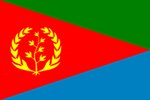UNDP-GEF to support GoSE on adaptation to climate change in Tsilima highlands and plains, Eritrea’s food basket
Jul 1, 2015
Gebremichael Gebremeskel (65), is one of the residents of Adi Abzage village in Tsilima plains. He is a champion farmer who voluntarily started soil and water conservation efforts in the vast plains. Initially, people said he was crazy but they have since become admirers of his work and have acknowledged his efforts. “Soil and water conservation has helped us to use the run-off water for irrigation. I grow sorghum, wheat, barley and vegetables. My dream is to change this place into a paradise” he said.
The Government of the State of Eritrea (GoSE in collaboration with UNDP and the Global Environmental Facility (GEF) held an inception workshop on 29th and 30th June 2015 for the project “Mainstreaming climate risk considerations in food security and Integrated Water Resources Management (IWRM) in Tsilima highlands and plains. The proposed project aims at reducing vulnerability to impacts of climate change, increasing awareness on water management, knowledge and understanding of climate change risks and promoting transfer and adoption of climate change adaptation technologies to improve agricultural productivity. The project will work closely with the Ministry of Land, Water and Environment and in collaboration with the National Agriculture Research Institute (NARI) to enhance the institutions capacity for climate related research. Ultimately this will ensure that agricultural production strategies are informed by research and knowledge.
The project will encourage long term measures for watershed rehabilitation, groundwater recharge, climate smart crop and livestock production practices. Already, residents have been involved in soil and water conservation practices such as construction of check dams, gabions and terracing to slow the velocity of concentrated water flows and prevent soil erosion. Tsilima is amongst the most agriculturally productive lands in Eritrea.
Climate models suggest that Africa’s climate will generally become more variable, with high levels of uncertainty regarding climate projections in the Horn of Africa, making agriculture-dependent livelihoods even more vulnerable. Eritrea is vulnerable to climate change and variance as observed through an assessment undertaken during the development of the National Adaptation Programme of Action (NAPA). The assessment observed increased climate variability, recurrent droughts, flash flooding and rise in sea level in the coastal areas and islands. These factors will have a significant and detrimental impact on food security, vulnerability, poverty and economic development. Climate change threatens to make this dire situation worse by affecting water resources through reduced groundwater recharge brought about by decreased precipitation and increased temperatures and evaporation. Tsilima is amongst the most agriculturally productive lands in Eritrea and GoSE has identified food security to be critical for sustainable economic growth of the country.
It is projected that initiatives under this project will enhance food security, address vulnerability and contribute to economic development.
The Mainstreaming Climate Risk Considerations in Food Security and IWRM in Tsilima Plains, Eritrea project will start in 2016 and is estimated to cost USD 36,550,000 (GEF - 9,050,000; UNDP – 2,500,000; and GoSE – 25,000,000).






